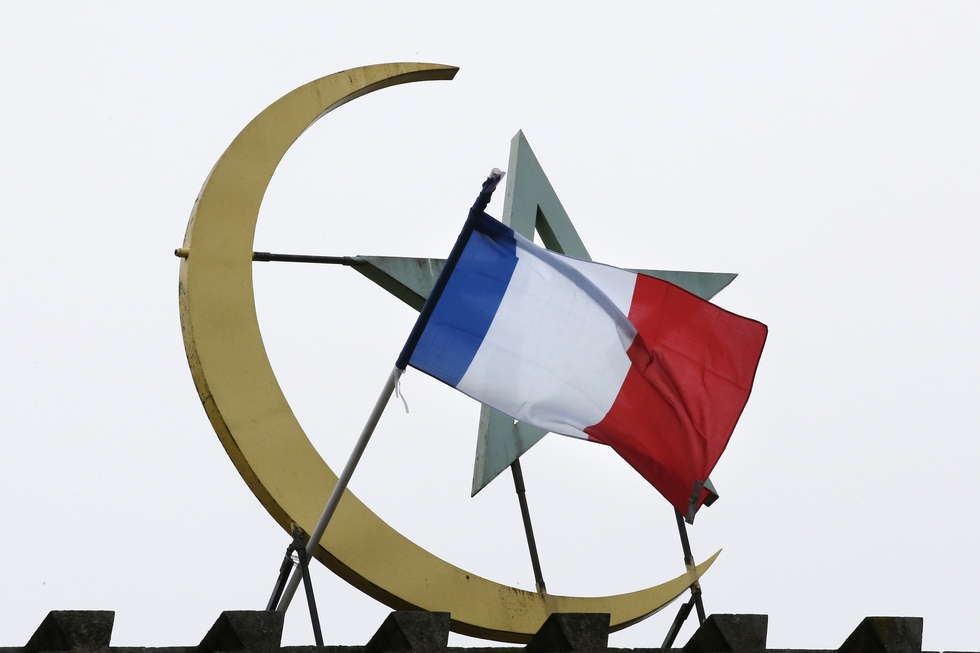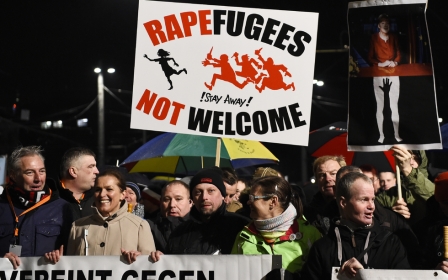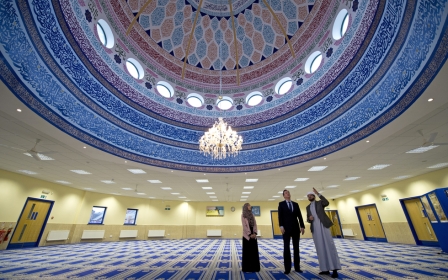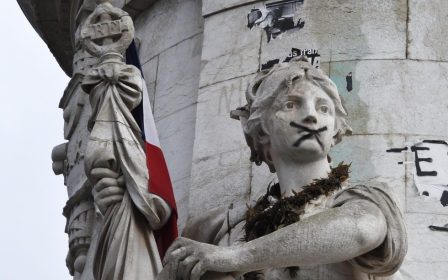Paris attacks: The terror that France spawned

France will no doubt remember 2015 as its very own "annus horribilis". From the Charlie Hebdo murders to the November attacks across Paris, the country remains shell-shocked, licking its wounds and wondering how such carnage could take place on its very shores.
France, like most Western nations, is used to viewing terror and bloodshed abroad. Images of dead bodies and gutted buildings are what people see on television. This normally happens in Baghdad or Damascus, Tripoli or Tunis but not in the capital of France, the world's fourth most powerful nation in the world.
And yet those calamities befell the country and France is now having to assess the situation that lead to this.
A different attack, a similar debate
The debates raging across the political class and the commentariat are almost all the same: is Islam compatible with modernity? Should Muslims do more to stop radicalisation? Is the internet a conduit for terror-grooming?
Across the board the questions haven't changed, bland, predictable and above all self-reassuring.
The evil, that pundits from all sides denounce, comes from elsewhere. Benevolent and civilised France is unable to process why this could happen.
And yet, like most political crimes, terrorism - a legacy of the French revolution - has an origin and a reason.
It is particularly galling for the French to realise that almost all of the terrorists who struck both in January and 10 months later were born and bred French men and women.
These were not jihadis brought up in the slums of Peshawar or Mogadishu but French nationals who grew up in the suburbs of major French cities and who studied in the very same schools as the rest of the population.
Repeating that it's the "internet", "Islam" or "backward cultures" that causes terror might provide a short-lived sense of relief; the reality is that nothing happens in a vacuum.
The French youth that are carrying out these atrocities are products of French society and the reality is that there is only a tenuous link between terror in the Middle East and the one striking France.
Aside from their religion Islam, all terrorists come from the same backgrounds. Working class immigrant families from former French colonies. What the Kouachi brothers or Amedy Coulibaly have in common is not a fondness for mosque attendance but a similar journey that has left them marginalised and alienated from the very country they were born into.
An overwhelming majority of North African and sub-Saharan Africans in France describe the same sense of alienation they feel living in a country that is nominally theirs but which continuously rejects them. A French national from an ethnic minority is four times less likely to be offered a job than his French (ethnically white) counterpart. Like black Americans, North Africans are three times more likely to be handed custodial sentences for s similar offences as a white person's.
These daily statistics are almost secondary when you consider the limited chances to rent out property in certain parts of the country or simply being allowed inside certain venues.
When French Prime Minister Manuel Valls himself speaks of French "apartheid" it's an indication France really is facing a problem.
The irony of course is that Valls, like many of France's political class, is a contributing part of the problem. When visiting the suburb of Evry a few years ago he was caught on camera complaining of the excessive number of black and brown people, adding "can we not have more whites, more blancos" here. The video which went viral was widely commented on but Valls was unapologetic and it is this shameless and unabashed racism that so many from France's ethnic minorities denounce, yet their denunciation continues to fall on deaf ears.
Integration
Fatiha, a young woman of Algerian origin who'd embraced "integration" in every aspect, including marrying a white French man and giving their daughter a French name, explains that despite all her efforts to fully "assimilate", she eventually had to move to the UK to escape the racism she'd suffered since her childhood.
She explains that since her early teens, when she started walking to school alone, she'd hear the local neighbours shout every time she walked on the pavement "go back home 'bicotte' (French derogatory word for Arabs)".
That casual racism only increased as she grew older. When her marriage collapsed she moved to the UK where she claims she could barely believe the difference. Being served by a hijabi in a London department store was like being served by a Martian she said; it was unthinkable in the France I grew up in and even less so today.
Debates such as the issue over the hijab have split the country and proved to be hugely polarising. Muslim intellectuals normally critical of the headscarf found themselves its most vocal supporters given the extremely bigoted tone these discussions took on.
But perhaps what is the most troubling aspect of French racism is its double standard. While opposing the hijab is so normalised even game show hosts openly criticise it, discussing the Jewish skull cap or kippah is an absolute no-no. Anti-Semitism is understandably unacceptable, the problem is anti-Arab, anti-black racism however is perfectly normalised with pundits regularly making remarks that would simply be unthinkable in reference to Jews.
When Charlie Hebdo drew unsavoury cartoons of the Prophet Muhammad depicting him as a depraved man surrounded by women and even children, Muslims complained. They were dismissed as expressing excessive Muslim sensitivity and being unable to process the concept of free speech and the "right to offend".
However, when veteran cartoonist Maurice Siné joked that Jean Sarkozy, the son of the former French president, converted to Judaism to marry a wealthy Jewish heiress, his editor told him to apologise, arguing that his comment could be seen as anti-Semitic. When he refused, he was sacked. Freedom of expression in France is therefore seen as a one-sided value that is only used against Muslims.
Last month Latefa Ibn Ziaten, the mother of one of France's first victims of terrorism, army officer Imed Ibn Ziaten, spoke at the national assembly on the need for communities to come together and oppose extremism. This grieving mother was booed out of the chamber because her headscarf was described as contrary to the values of the republic, yet the following month in a show of unity with Jewish victims, several high ranking officials attended debates in parliament wearing kippahs.
Kippahs like headscarves are officially outlawed for anyone working in the civil service or any state institution. However, while the law is unforgiving for Muslims wearing it, it remains very accepting of Jews wearing what it describes as "ostentatious signs of religion in the public sphere".
This two-tier approach to community relations has poisoned life for minorities and fuelled the sense of alienation of those who see their prospects limited and their plight ignored.
And here is where ISIS or Al-Qaeda recruits step in. These French youths feel rejected in their native countries, but have little or no links to their parents' homelands. In this context the concept of a "mythical" state that welcomes Muslims from across the world becomes increasingly attractive. These youths have no work, no prospects. Most if not all have peddled in delinquency. They are then offered an opportunity to defend a "cause", hold a gun and acquire a "status" which throughout their lives they've been denied.
The recruiting agent is not so much the internet as the society that endeavours to reject them. Of course not all those who grow up on sink estates go on to engage in a major international terror outfit but, like all low level criminals who come from poor backgrounds, so too are French terrorists emerging from the impoverished "banlieues" of France.
This, coupled with France's staunch support for ousting Syrian President Bashar al-Assad, has meant that ISIS recruiters are having to do very little to persuade disenfranchised youth to join their ranks.
Meanwhile France refuses to question why it has been a primary target. Its role in the destruction of Libya, turning the North African state into an ISIS playground, is completely absent from the dominant narrative. Libya it appears descended into inexplicable chaos for no valid reason. Rather than recognising the role France played in destroying the fabric of this former African stalwart, French pundits are once again implying an inherent tendency of Arab and Muslim youth for terror.
In the immediate aftermath of the November attacks, France introduced a raft of oppressive laws to fight terrorism. It begs the question of what France would do if it faced the destruction and scale of attacks countries such as Iraq or Libya have suffered.
In this context it doesn't take a browse on the net to consider joining ISIS; switching on French TV may well be a more effective recruiter.
- Hafsa Kara-Mustapha is a journalist, political analyst and commentator with a special focus on the Middle East and Africa. She has worked for the FT group and Reuters and her work has been published in the Middle East magazine, Jane's Foreign report and a host of international publications. A regular pundit on TV and radio, Hafsa can regularly be seen on RT and Press TV.
The views expressed in this article belong to the author and do not necessarily reflect the editorial policy of Middle East Eye.
Photo: A French national flag is flown on top of the Grand Mosque of Paris, on 27 November, 2015 in memory of the 130 victims of the 13 November, 2015 coordinated terror attacks in Paris claimed by the Islamic State group (AFP).
Middle East Eye propose une couverture et une analyse indépendantes et incomparables du Moyen-Orient, de l’Afrique du Nord et d’autres régions du monde. Pour en savoir plus sur la reprise de ce contenu et les frais qui s’appliquent, veuillez remplir ce formulaire [en anglais]. Pour en savoir plus sur MEE, cliquez ici [en anglais].





